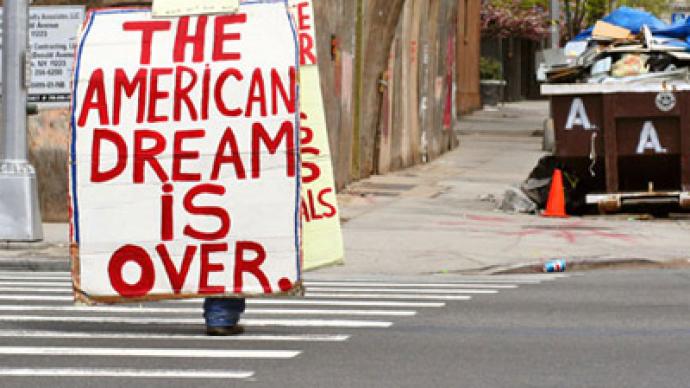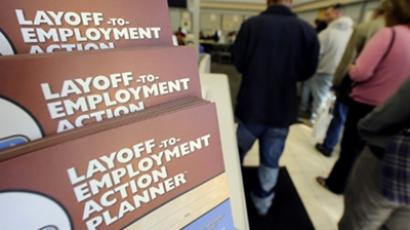Workers in trouble: US middle class disappearing

The US was once home to the picture-perfect American dream. A house, a car, and a job symbolized the middle class as the core of a prosperous country. Yet for an increasing amount of Americans some or all of these are now out of reach.
“This country was founded on the ideals of life, liberty and the pursuit of happiness. How can you be happy if you can’t pay your rent? How is this American in any shape or form?” asked journalist and activist Mike Elk. The new America is littered with millions of homes lost and abandoned with the unemployed officially numbered at over 13 million still queuing to get a job. Does this mean the middle class is disappearing in the US?“There have been 4 pillars that supported the American middle class: the chance to retire, the chance to send your kids to higher education, graduate school or university, the chance to work and afford a comfortable standard of living, and access to medical care. And if we look, all four of these pillars are chipped, cracked or swaying,” explained economist Max Fraad Wolff from the New School in New York.Today over 60 percent of Americans say they typically live paycheck to paycheck – leaving little for college fees, mortgage payments or retirement. The US is increasingly being divided into rich and poor with the traditionally large center – the middle class – being squeezed out. The bottom 50 percent of earners today own less than 1 percent of the country’s wealth. “America has gone from being the most egalitarian nation back in the 1960s and early 70s, to now, where the gap between the rich and the poor is the widest in the United States than any of the industrialized nations. So, by every index the middle class is dead in America,” said trends forecaster Gerald Celente. Caleb is from a traditional American middle class family. The 23-year-old college graduate lives in a rented basement, and says middle class jobs do not exist anymore.“I was taught all my life by the media and in school that the U.S. was the greatest country in the world, because if you just work hard, you can be part of this magical middle class. I am part of a generation of youth who will never have this so-called American dream,” he sighed. Finding work on average takes eight and a half months now and with 6 Americans vying for each job, the prospects for the country’s youth look dim.“The future that lies is living in basements like I do. Some of them are becoming homeless. Others are going to prison. There is increased crime and drug use, and things like that. There is also the wars – the military, they don’t have a recruitment problem anymore now that the economy has declined so much“, said Caleb.What has not declined is military spending. “I’m a teacher, there’s teachers laid off left and right. This is the future of our country, and we’re spending tremendous, tremendous billions are being spent on the war machine,” said Elo-Mai Noormets, a New York teacher. These priorities have had a devastating effect on middle and working class America.Melony Samuels has been running a food pantry in New York for years. “Now we are seeing people that do have an education, used to have decent jobs, now on line. Coming here teary-eyed, they never thought this would happen to them,” described the founder of the Bedstuy Campaign Against Hunger. Some 40 percent of the 43 million food stamp recipients today are working Americans, and every 5th child now lives below the poverty line.America grew prosperous on the belief that the next generation of workers would live better than the first, but nowadays – the outlook for the future is anything but optimistic. “We’re going to see more and more of a squeeze – more people on food stamps, more people at food kitchens, and more malnourished and hungry children in this country, no question,” said author and food expert Fred Kaufman.As the foundation of the middle class continues to crumble, concerns are growing that the heart of the American dream could stop beating altogether.And if the middle class collapses, the face of America in the 21st century could become one this country has never seen before.Thom Hartmann, the host of the Big Picture on RT explained that over the last 30 years the American economy has dramatically shifted, away from production and towards consumerism and debt. “The middle class is tapped out,” he said, explaining that Americans began to use credit, financial equity and other means to spend more without saving and investing. “We’ve seen the wealth of the middle class whipped out.”He credits formed US President Ronald Reagan for destroying the US middle class, arguing his policies and a group of ideologues threatened by social change.“Before Reagan became President we were the largest importer of raw materials in the entire world. We brought iron ore into the country and turned it into things like radios, TVs, cars. We were the largest exporter of finished goods. We were the world’s largest creditor. We have completely reduced that in 30 years. We are now the world’s largest debtor and the world’s largest importer of finished goods and the world’s largest exporter of raw materials. We have becoming the mining operation for the world and the consumer,” Hartmann added.He explained than prior to the civil rights movement groups of ideologues recognized a rise in the middle class was coming, and sought to correct it. They saw the middle class as a threat.“They took down the middle class,” noted Hartmann.














